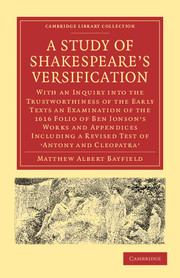 A Study of Shakespeare's Versification
A Study of Shakespeare's Versification Book contents
- Frontmatter
- PREFACE
- Contents
- ERRATA
- I SHAKESPEARE'S VERSIFICATION
- II THE EARLY TEXTS
- CHAPTER III ABOLITION OF RESOLUTIONS AND OTHER ABBREVIATIONS IN THE VERSE: Richard II and Richard III examined
- CHAPTER IV ABBREVIATIONS IN THE VERSE (continued): the Quarto Plays Hamlet, Othello, and Lear examined
- CHAPTER V ABBREVIATIONS IN THE VERSE (continued): the Folio Plays Macbeth, The Tempest, Cymbeline, Coriolanus, Antony and Cleopatra and Julius Caesar examined (Macb. p. 140, Temp. p. 154, Cymb. p. 160, Cor. p. 184, A. and C. p. 204, J. C. p. 226)
- CHAPTER VI ELISION IN THE FINAL FOOT
- CHAPTER VII ON CERTAIN SPELLINGS
- CHAPTER VIII ABBREVIATIONS IN THE PROSE
- CHAPTER IX CONCLUSIONS
- APPENDICES
- THE TRAGEDY OF ANTONY AND CLEOPATRA
- INDEX
CHAPTER VIII - ABBREVIATIONS IN THE PROSE
from II - THE EARLY TEXTS
Published online by Cambridge University Press: 01 June 2011
- Frontmatter
- PREFACE
- Contents
- ERRATA
- I SHAKESPEARE'S VERSIFICATION
- II THE EARLY TEXTS
- CHAPTER III ABOLITION OF RESOLUTIONS AND OTHER ABBREVIATIONS IN THE VERSE: Richard II and Richard III examined
- CHAPTER IV ABBREVIATIONS IN THE VERSE (continued): the Quarto Plays Hamlet, Othello, and Lear examined
- CHAPTER V ABBREVIATIONS IN THE VERSE (continued): the Folio Plays Macbeth, The Tempest, Cymbeline, Coriolanus, Antony and Cleopatra and Julius Caesar examined (Macb. p. 140, Temp. p. 154, Cymb. p. 160, Cor. p. 184, A. and C. p. 204, J. C. p. 226)
- CHAPTER VI ELISION IN THE FINAL FOOT
- CHAPTER VII ON CERTAIN SPELLINGS
- CHAPTER VIII ABBREVIATIONS IN THE PROSE
- CHAPTER IX CONCLUSIONS
- APPENDICES
- THE TRAGEDY OF ANTONY AND CLEOPATRA
- INDEX
Summary
Certain abbreviations are commonly used nowadays both in conversation and in poetry, as I'll, he'll, we'll, you'll, they'll, 'tis, 'twas, 'twere, I'd, etc. They of course occur frequently in Shakespeare; but in the early texts of his plays we find also the following in the prose as we have already found them in the verse:— y'are, you're, ha' (have), 's (us,- his), t' (to), i' (in), o' (of, on), th', i'th', o'th', to't and toot (to it), do't, in't, with't, for't, on't, by't, is't or ist, tane (taken), together with the unmistakable vulgarisms a for he and have (occasionally for it), on't for of it, and 'em for them. Also moe or mo occurs thirty-three times for more, twenty-six times in the prose and seven times in the verse. No doubt some of these forms (but surely not all?) were employed by Elizabethan gentlefolk in conversation, and it has consequently been supposed that Shakespeare introduced them not only into his prose but also into his dramatic verse, in order to render it more natural and life-like. We have, however, no evidence that they were used in dignified and formal speech, either in private or on public occasions. We ourselves fall into several locutions in familiar talk that are carefully avoided in such circumstances.
- Type
- Chapter
- Information
- A Study of Shakespeare's VersificationWith an Inquiry into the Trustworthiness of the Early Texts an Examination of the 1616 Folio of Ben Jonson's Works and Appendices including a Revised Test of 'Antony and Cleopatra', pp. 262 - 279Publisher: Cambridge University PressPrint publication year: 2009First published in: 1920
